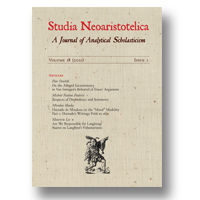|
1.
|
Studia Neoaristotelica:
Volume >
15 >
Issue: 6
Miroslav Hanke
Scholastická logika „vědění“ II.:
Axiomy introspekce a iterované modality mezi 15. a 16. stoletím
abstract |
view |
rights & permissions
| cited by
Further development of the research on the fourteenth-century logic of iterated modalities (Heytesbury, Wyclif, and Peter of Mantua) leads to further exploration in fifteenth- and sixteenth-century Italian scholasticism, in particular, the contributions of Paul of Venice and his followers (including Paul of Pergula, Cajetan of Thiene, and Domenico Bianchelli). The research confirms the well-established notion of “British logic in Italy”, as the major logical strategies used in the analysed works can be traced back to earlier British authors. Logically speaking, the problem of iterated epistemic modalities (such as knowledge and doubt) was framed as debate on the consistency of the hypothesis that an agent doubts whether she knows φ and the hypothesis that an agent knows φ and doubts whether she knows φ, in which the principles of positive and negative introspection play a major part. Philosophically speaking, the debate on the possibility of doubting one’s own knowledge utilised theories of evidence and scientific proof and philosophy of the mind (including the problems of direct and reflexive mental acts and of propositional attitudes).
|
|





